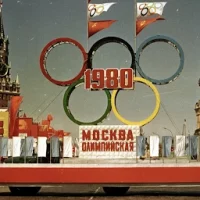On March 16, 1968, in what was one of the most shocking incidents of the Vietnam War and in the history of the U.S. military, an estimated 500 Vietnamese villagers were killed by U.S. Army soldiers from Company C of the 1st Battalion, 20th Infantry Regiment, 11th Brigade of the 23rd (Americal) Infantry Division in… Read More "My Lai — Atrocity and Cover-up in the Midst of Vietnam"
The Olympic Games, despite their lofty ideals, have since their inception in ancient Greece intertwined the best of athletic competition with the world of politics. Case in point: The 1980 Summer Games in Moscow, which took place less than a year after the USSR invaded Afghanistan. While there was no way to undo the invasion,… Read More "Moscow Gets Torched — The Boycott of the 1980 Summer Games"
“The First Terrorist Attack in the U.S.” – The Letelier-Moffitt Assassinations
After Augusto Pinochet led a coup d’état in Chile on September 11, 1973, taking power from the democratically elected President Salvador Allende, he exiled Allende’s Foreign Minister, Orlando Letelier. After Letelier sought asylum in the United States, Pinochet believed he was acting as an informant to the U.S. government. Consequently, he was targeted by the Pinochet… Read More "“The First Terrorist Attack in the U.S.” – The Letelier-Moffitt Assassinations"
“Our government has evidenced moral bankruptcy”: The Blood Telegram and the 1971 Bengali Genocide
Pakistan after independence was a strange creation: the capital, Islamabad, and most of the power were located in the west while the rest of the country was located far out east, separated by another – and often hostile – country. The Bengalis were poorly treated and scorned by the Pakistanis; in March 1971, the nationalist… Read More "“Our government has evidenced moral bankruptcy”: The Blood Telegram and the 1971 Bengali Genocide"
Castro’s Cuba – The Early Days
On January 1, 1959, after a sustained armed revolt led by Fidel Castro and others took control over most of the country, Fulgencio Batista fled Havana, marking the end of one era and the beginning of another. With the departure of the despised dictator, there was initially hope that life in Cuba would improve. William… Read More "Castro’s Cuba – The Early Days"
El Salvador, the Sheraton Hotel Siege and the Jesuit Murders — November 1989
The civil war in El Salvador lasted from 1979-1992 and was fought between the government and the Farabundo Martí National Liberation Front (FMLN), a coalition of five leftist guerrilla groups that attempted a military coup in 1979, which was followed by many violent attacks on the government and civilians. On November 11, 1989, twenty armed guerrillas stormed the… Read More "El Salvador, the Sheraton Hotel Siege and the Jesuit Murders — November 1989"
444 Days: Memoirs of an Iran Hostage
More than thirty years later, the Iran Hostage crisis still ranks as one of the most traumatic diplomatic events in U.S. history. Dissatisfied with the corrupt and ineffective regime of Reza Shah Pahlavi, many Iranian citizens began protesting the Iranian government in 1977. In 1979 after nearly two years of protests and strikes, the Shah was… Read More "444 Days: Memoirs of an Iran Hostage"
Dissidents, Spies, and Attack Cartoons — Life at the U.S. Interests Section in Havana
Diplomatic relations between the United States and Cuba were frozen in time for more than 50 years. After the U.S. formally severed ties on January 3, 1961, the two countries were not technically represented by embassies but rather Interests Sections, both under the diplomatic aegis of the Swiss Embassy. Relations were restored on July 20, 2015. From… Read More "Dissidents, Spies, and Attack Cartoons — Life at the U.S. Interests Section in Havana"
Halloweens Around the World
BOO! Halloween is a holiday on October 31st where costumes, tricks, and treats reign supreme. Originally a pagan holiday, Halloween is a time when children, and often times adults, dress up in silly and creative costumes; some go door to door asking for candy while others attend costumes parties and dance the night away. Though Halloween… Read More "Halloweens Around the World"
The Hungarian Revolution of 1956
The early 1950s witnessed a thaw in the Communist monolith. Stalin’s death in 1953 led to Khrushchev’s “secret speech” in 1956 which condemned excesses of the past. The U.S. and USSR agreed to a treaty in 1955 establishing Austria as a neutral and demilitarized country, which encouraged hopes in Hungary of a similar arrangement. July… Read More "The Hungarian Revolution of 1956"

